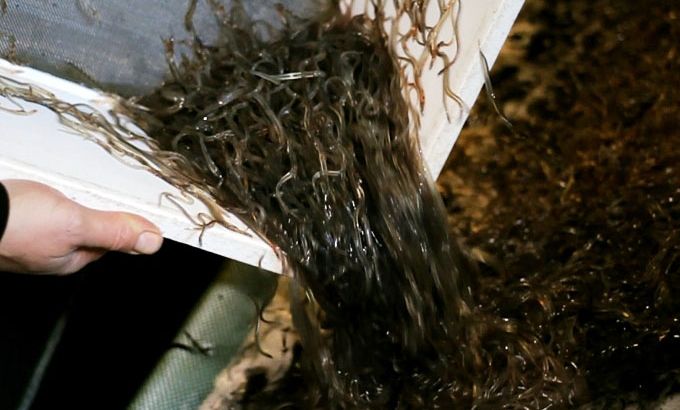
Return of Elvers
In Gloucestershire conservationists and fishermen are working together to secure the future of the European eel.
Incredibly, every eel in the world begins its life in the North American Sargasso Sea. From there the larvae embark on epic migrations to rivers all over the world. Each stays for 20 years in fresh water before making the return journey to spawn and die.
But today their age-old migratory pathways are often disrupted by flood banks and locks, as well as severe overfishing. When supplies were abundant, elvers (baby eels) were taken for granted as a cheap source of protein. But today they are a rare delicacy prized in Chinese and Japanese cuisine, and prices can reach up to $1,000 per kilogramme. This has resulted in a huge increase in illegal poaching and trawling, further exacerbating the problem.
Keep reading
list of 4 itemsTurtles swimming to extinction in Malaysia as male hatchlings feel heat
Could shipping containers be the answer to Ghana’s housing crisis?
Thousands protest against over-tourism in Spain’s Canary Islands
Over the past 30 years, the number of elvers in British rivers and estuaries has diminished by 95 per cent – placing the European eel on the country’s critically-endangered list of wild animals. Now eel fishers across Europe, members of the Sustainable Eel Group, are undertaking various initiatives to boost eel numbers. These include ‘eel passes’ – man-made reed ladders that sit alongside the flood banks and allow the eels to navigate their way around these blockades.
Another initiative is the Severn and Wye Smokery’s eel reintroduction programme. Elvers are fished in large nets from the lower end of rivers like the Severn in Gloucestershire then reintroduced to lakes and rivers across Europe. For every eel sold, at least two healthy young eels are returned to the river.
The idea behind these projects is that in order to safeguard the species, businesses and conservationists need to collaborate. A Swedish company, Scandinavian Silver Eel, takes juvenile eels from British rivers, which would have only a five per cent chance of survival, and flies them to Sweden, where they have a 98 per cent survival rate.
Around 70 per cent of these young eels are returned to the river system, and 30 per cent are grown in aquaculture farms for human consumption. This is the basis for sustainable eel production, while at the same time providing a significant opportunity for large numbers of silver eels to migrate back to the Sargasso for reproduction.
Russell Beard travels to Gloucestershire, England, to meet conservationists and fishermen who are working together to secure the future of the European eel.
earthrise airs each week at the following times GMT: Friday: 1930; Saturday: 1430; Sunday: 0430; Monday: 0830. Click here for more on earthrise. |
